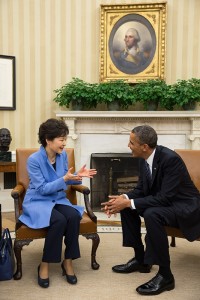U.S.-South Korea Alliance Reaffirmed During Park’s State Visit to the US
President Park Geun-hye of South Korea concluded her four-day state visit to the U.S. with a joint press conference with President Obama on Friday, October 16. In the joint statement, both leaders reaffirmed their unwavering commitment to their military alliance, called for denuclearization of the Korean Peninsula, and committed to further address human rights issues in North Korea. The major accomplishment of President Park’s visit, according to many political analysts, is the reaffirmation of the security alliance between the two countries, despite some recent speculations about the relationship. During the visit, Park was honored by a full military parade at the Pentagon, a rare ceremony which many major South Korean media outlets regarded as a significant symbol of the U.S.-South Korea security commitment.
The reaffirmation of this mutual security commitment is especially significant in light of tensions which seemed to threaten it last year. In early September when Park attended the Victory Parade in China against American wishes, many critics, especially from Japan, voiced concerns that South Korea was “tilting” toward China at the expense of its relationship with the U.S. However, in her speech at the Center for Strategic and International Studies (CSIS), Park attributed the “miraculous success” in South Korean development to the U.S.-South Korean alliance and stressed its importance in achieving peace in Northeast Asia. She expressed her gratitude for the continued alliance between the two countries and restated South Korea’s commitment to strengthening the bilateral relationship. As a response, Obama expressed his support for a better relationship between China and South Korea.
Another major topic of discussion during Park’s visit was North Korea. In the joint statement published after the summit, both the U.S. and South Korea strongly condemned North Korea’s weapons and missiles capabilities, expressed their willingness to engage with North Korea if the country gives up its nuclear weapons programs, and supported Park’s vision of peaceful unification of the Korean Peninsula. Furthermore, in her speech at CSIS, Park urged the international community to work together on the North Korean issue and maintain the zero-tolerance policy towards North Korea’s provocations.
Although Park’s visit is widely regarded as successful, it is not without its shortcomings. The Pentagon rejected South Korean Defense Minister Han Min-koo’s request to transfer the key technologies of the KF-X fighter jets. Instead of allowing South Korea to develop its own indigenous fighter jets, the U.S. only promised to increase cooperation on military technology in the defense industry, continuing the historical trend of South Korean dependency on American military capacities.
Furthermore, the bilateral relationship between South Korea and Japan remains uncertain. The U.S. hopes that its two key allies in Northeast Asia would stabilize their relations by addressing their historical disputes. In her speech at CSIS, Park welcomed the idea of a bilateral summit between her and Prime Minister Abe of Japan. However, she added that such meetings will be meaningful only when Japan acknowledges elements of its history, including the issue of comfort women.
President Park returned to South Korea on Sunday, and was greeted by the positive public opinion on her actions in the U.S. However, there still is a long road ahead of achieving permanent peace in the region. The next big task for Park will be hosting a trilateral summit with China and Japan in November.

